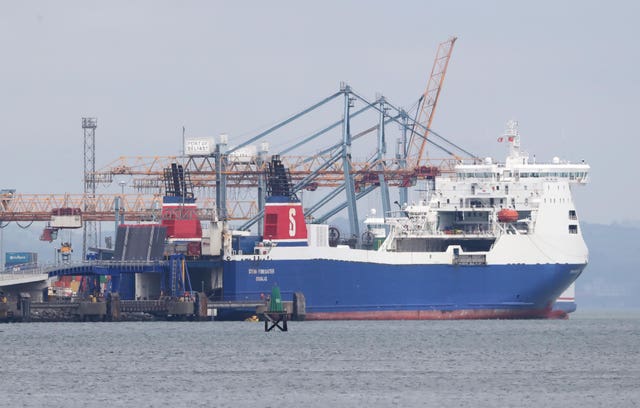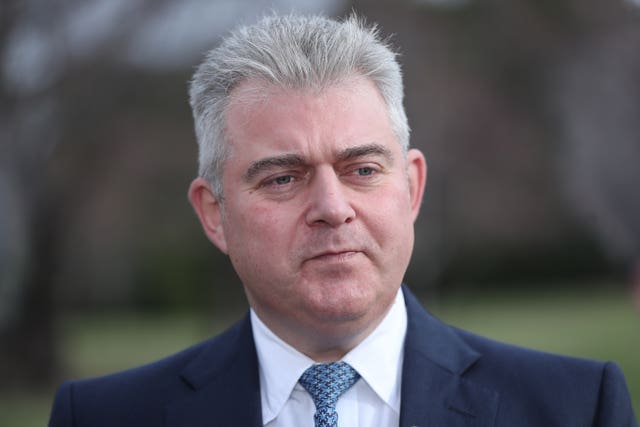Government says NI port checks will be kept to ‘minimum’
A proposal to stall construction work on expanding checking facilities at the region’s ports sparked heated exchanges at a Stormont Executive meeting.

The Government has restated the requirement for an expansion of regulatory checks on goods entering Northern Ireland from Great Britain.
The statement came amid a political row at Stormont over a proposal to stall construction work on new checking facilities at Northern Ireland’s ports.
Agriculture minister Edwin Poots is seeking to pause the work following the Government’s legislative move to guarantee unfettered access throughout the UK’s internal market.
He has written to the UK Department for Environment Food and Rural Affairs to seek clarity on whether he should continue to divert funds into the expansion projects.
In the summer, the Government said enhanced regulatory checks would be required on animal and food products crossing the Irish Sea from Great Britain under the terms of the Brexit deal.
The Executive assumed legal responsibility to undertake the work for the Government to enable it to fulfil its international obligations under the Withdrawal Agreement.
Mr Poots is seeking to establish whether the Government’s Internal Market Bill or its imminent Finance Bill– proposals which seek to remove barriers on the movement of goods within the UK – will mean there will be no need for extra checks at local ports.
Political rivals and some senior civil servants disagree with the DUP minister’s move, and the difference of views led to fractious exchanges at an executive meeting on Thursday.
On Friday, the Government said it was working with the Executive to minimise the checks required.
“We have always been clear that, following the Northern Ireland Protocol, there would be a limited expansion of facilities at some existing entry points, where certain controls for animal and plant health already take place,” said a Government spokeswoman.
“We have submitted to the EU applications for these entry points on time and there will be no new customs infrastructure in Northern Ireland.
“We are continuing to work closely with the Executive on proposals to minimise requirements on the movement of food and agricultural products, in line with the approach we set out in our May Command Paper.”

Stormont ministers convened for a virtual executive meeting on EU exit issues on Thursday.
When the port infrastructure issue was raised it prompted robust and heated exchanges, involving both rival politicians and a senior civil servant.
One source described it as “hot and heavy” and another described it as a “shouting match”.
A vote proposing the halting of the work was defeated but the issue is due to be revisited when ministers meet again.
The meeting was adjourned at about 9pm so legal advice could be sought.
Attorney General Brenda King has been asked to provide ministers with guidance on whether stopping the work would undermine the executive’s legal obligation to carry out a Government instruction.
The meeting was scheduled to reconvene on Friday.

The South Down MLA, whose constituency includes Warrenpoint Port, said businesses were in the dark.
“Ports need to know what checks will be in place post-Brexit,” she said.
“The Port (Warrenpoint) and local traders have been left in limbo because Edwin Poots has sought to put a stop to preparations being made.
“This has not only added to the uncertainty but also potentially jeopardises future food supply due to the absence of entry points for food and animals.
“The minister needs to bring forward clear and concise information as a matter of urgency.”
Specifically, the Bill, if enacted, would undermine parts of the Northern Ireland Protocol contained within the EU Withdrawal Agreement struck by the EU and UK.
Under the protocol, which will kick in if no wider trade deal materialises, Northern Ireland will continue to follow single market rules for goods and administer the EU’s customs code at its ports.
It was designed to avoid a hard border on the island of Ireland, but unionists have been vehemently opposed to it, insisting it instead creates an economic border between Northern Ireland and the rest of the UK.
Under the terms of the protocol, extra regulatory checks are required on goods entering Northern Ireland from Great Britain.
Goods crossing the Irish Sea will also be subject to customs processes to differentiate between products destined solely for Northern Ireland and those set for onward transport across the Irish border into the EU.
The Bill gives the Government the ability to override a number of provisions with the protocol.
Namely, ministers would be able to ditch the requirement for goods going from Northern Ireland to Great Britain to fill out export declaration forms.
The Government would also not have to adhere to a requirement to follow EU rules on state aid on all goods related to Northern Ireland.
Mr Poots would not be drawn into confirming whether he intended to halt work on the checking facilities when asked in the Assembly on Tuesday.
“I am not looking for barriers to be put around Northern Ireland,” he said.
“I am looking for access to our markets to be as free as possible and for people who are bringing necessary goods to us to have access that is as free as possible.”





